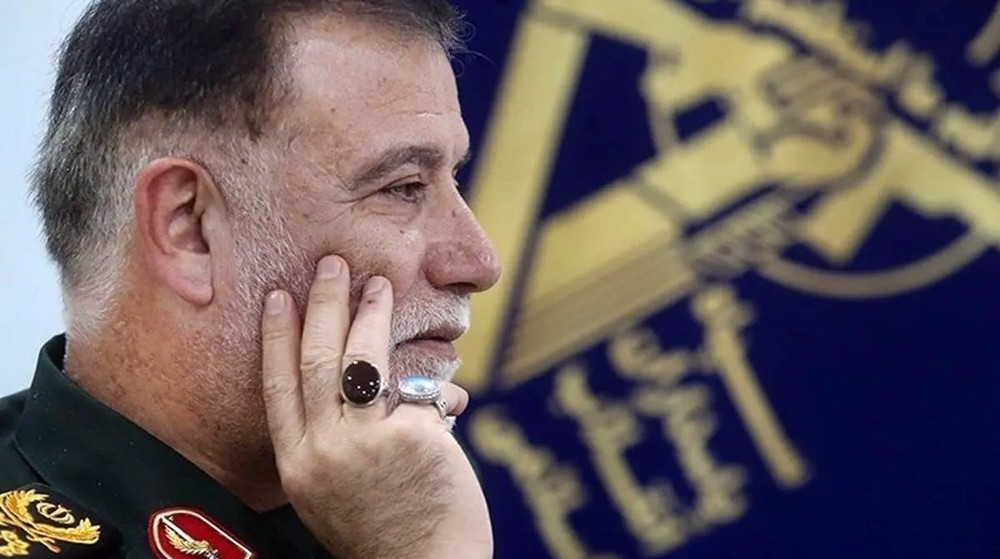AhlulBayt News Agency: General Abbas Nilforushan, the Deputy Commander for Operations of the Islamic Revolution Guard Corps (IRGC), was martyred in an Israeli airstrike on Friday in Beirut, alongside Hezbollah’s leader, Sayyed Hassan Nasrallah, the IRGC confirmed in a statement.
Over the massive airstrikes, Israeli forces deployed “bunker-busting” bombs, reducing several residential complexes to rubble in the densely populated Dahiyeh neighborhood in southern Beirut, killing dozens of civilians as well.
According to the Lebanese Health Ministry, six people were killed and 91 others injured in the bombardment, which leveled six apartment buildings. Hundreds more are feared dead as the rescue operations are underway.
The recent fatal strike signifies a major escalation in the conflict between Israel and Hezbollah, following a year of Hezbollah’s solidarity operations against the Isareli-occupied territories in support of the Palestinian people, with the Gaza war’s death toll exceeding 41,500.
In a statement on Sunday, IRGC confirmed the martyrdom of General Nilforushan who was also a military advisor to Lebanon in the Israeli airstrikes on Friday.
The IRGC condemned the “crimes of the Zionist regime” in Lebanon and extended condolences, while also congratulating the martyrdom of General Nilforushan to Ayatollah Seyyed Ali Khamenei, the Commander-in-Chief of the Iranian Armed Forces.
Who was General Nilforushan?
Born in 1966 in the Iranian city of Isfahan, Nilforushan played a vital role within Iran’s IRGC, overseeing ground forces as the Deputy Commander for Operations.
The 58-year-old military leader began his military career in 1980 with the Basij before joining the IRGC. He joined the IRGC at a young age and steadily climbed the ranks.
General Nilforushan played an active role in the Iran-Iraq war, referred to as the Sacred Defense in Iran, which lasted for eight years during the 1980s against Saddam Hussein’s Ba’athist regime.
Remarkably, he participated in the western and southern fronts during the war at the young age of 14.
This early involvement in the conflict demonstrated his commitment and dedication to Iran’s defense, ultimately shaping his military career and contributing to his rise through the ranks.
Throughout the war, he distinguished himself as a prominent commander, successfully leading several critical military operations.
Following the conclusion of the Iran-Iraq war, Nilforushan continued to broaden his expertise by pursuing academic studies in strategic management.
He eventually earned a Ph.D from Imam Hussein University, further solidifying his credentials as a military leader and strategist within the IRGC.
From 2005 to 2007, he held the position of Deputy Commander for Operations within the IRGC Ground Forces.
This experience laid the foundation for his later appointment as the commander of the IRGC Command and Staff College from 2010 to 2014, where he contributed to the development and education of the next generation of Iranian military leaders.
In June 2019, Nilforushan was officially appointed Deputy Commander for Operations of the IRGC by order of the corps’ Commander-in-Chief, Major General Hossein Salami, a post he held until his tragic martyrdom.
Nilforushan’s key role in the Axis of Resistance
Due to his extensive battlefield experience and unwavering efforts in supporting the Axis of Resistance—which includes groups such as Hezbollah in Lebanon and Palestinian resistance factions—General Nilforushan became a pivotal figure in advancing the cause of resistance against foreign occupation and intervention.
His unwavering engagement in both military and diplomatic strategies significantly proved instrumental in fortifying the Axis of Resistance.
Under his guidance, these groups managed to bolster their influence and capabilities despite ongoing threats posed by the Zionist regime.
As a strategic commander, Nilforushan played a crucial role in coordinating operations among various resistance forces, ensuring unity and effectiveness in their efforts.
Firmly rooted in the principles of the Islamic Revolution, he was a staunch defender of the rights of oppressed nations in the region, particularly the Palestinian and Lebanese people.
He consistently emphasized the importance of resisting global
oppression and fighting against arrogance, a stance that earned him
great respect and admiration among the resistance movements.
/129

